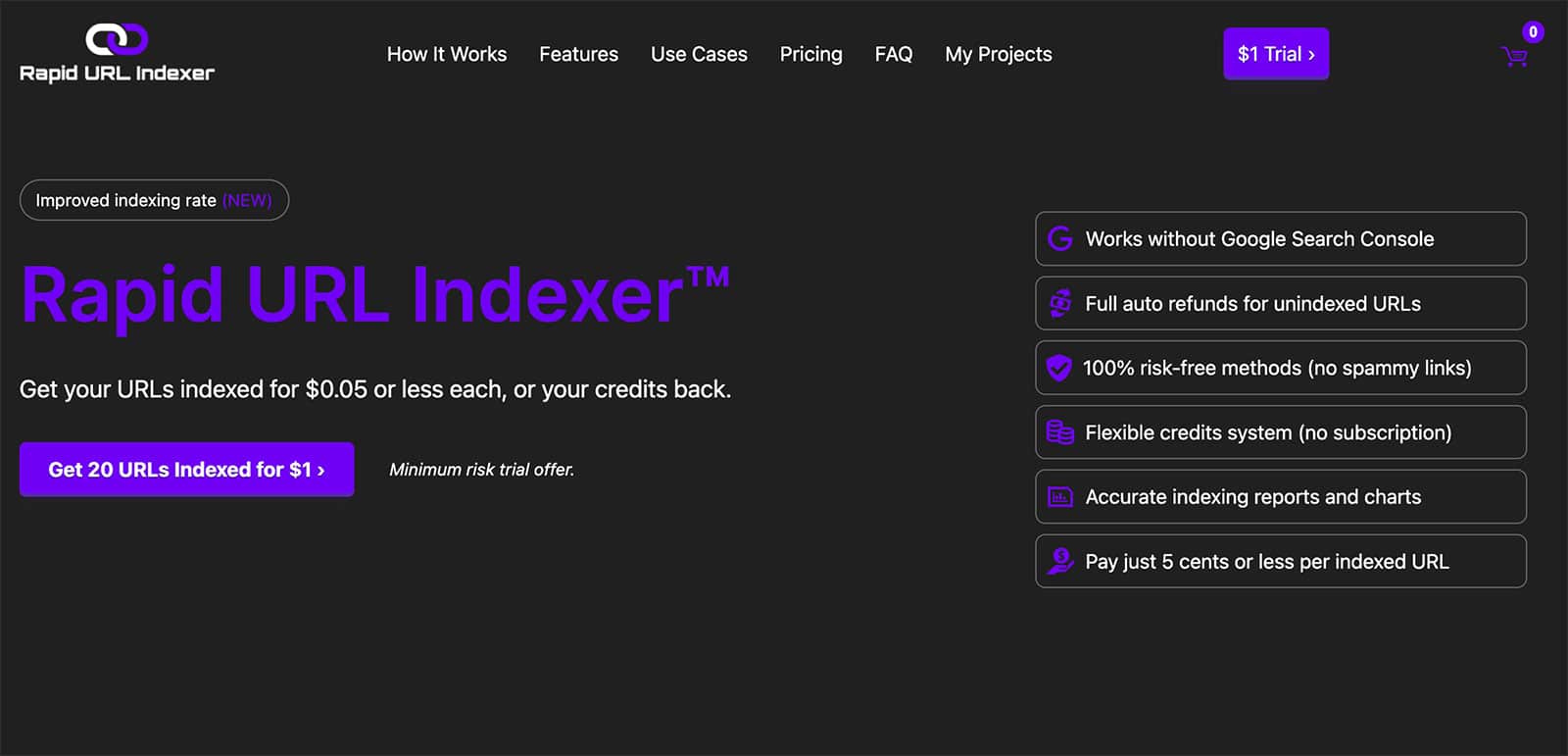If you’ve been following SEO trends, you’ve probably heard of the buzz around Rapid URL Indexer (RUI).
Indexing web pages is a necessity for enhancing your website’s online visibility, and this tool promises to quickly index websites with a 91% success rate—all for a modest fee of $0.05 per URL. It’s a game-changer for SEO professionals and website owners struggling with slow Google indexing times.
But is it too good to be true, or is it actually a legitimate tool that delivers on its promises? Let’s discuss.
Table of Contents
What Is Rapid URL Indexer?
Rapid URL Indexer (RUI) is a relatively new indexing service that indexes links for $0.05 or less per URL. This means that you can index 20 URLs for only $1. RUI offers credit refunds for URLs that don’t get indexed, making it a low-risk option for those seeking faster search engine rankings.
It’s arguably the most cost-effective indexing tool in the industry, considering it costs an average of $2.50 to $6 to index a single page. Most services also don’t offer money-back guarantees for pages that haven’t been indexed.
Sounds Good, But How Is It Different From Traditional Indexing?
If you’re new to indexing and SEO in general, you might be wondering if a paid indexing service like RUI is worth it. After all, Google indexes web pages for free. Why pay for a service that already costs nothing?
The answer is efficiency.
When you create a page with new content, search engines must first index it on their servers for it to appear in the top search results. Without indexing, it remains hidden until Google eventually discovers and crawls it.
Normally, this process happens automatically. However, it can take a lot of time—up to several weeks. You can submit URLs manually to Google’s indexing services to speed up the process, but it’s never guaranteed they’ll index your site immediately.
Enter Rapid URL Indexer. With this tool, you can bypass Google’s lengthy indexing process and have your websites indexed within a few days, if not a few hours.
The final report with the indexing status will appear after 14 days, and unindexed URLs will be refunded automatically.
This service uses safe indexing methods and Googlebot to crawl and index your URLs, so it’s totally safe and legal. It doesn’t use spammy links or other questionable techniques that might get your website banned like other URL indexers on the market.
What Are the Benefits of Using a Rapid URL Indexer Over Other Indexers?
Here are some tempting reasons to choose Rapid URL Indexer over other indexing services on the web:
- Competitive Pricing Model: Rapid URL Indexer uses a pay-as-you-go pricing model, meaning that you only pay for the URLs you need indexed, without any long-term commitments or subscriptions. Any unused credits will be refunded within 14 days.
- Budget-friendly: With this service, you only pay $0.05 or less per indexed URL. Though there’s a minimum purchase requirement of 20 credits (costing $1), it’s still a lot cheaper than other indexing services available.
- High Indexing Rate: According to the official website, the Rapid URL Indexing tool has an average indexing rate of 91%. This means most URLs submitted are quickly indexed by the tool, making it a reliable solution for those who need their content indexed quickly.
- Free WordPress Plugin: To make URL submission easier, RUI comes with a free WordPress plugin. With this plugin, you can submit dozens of new URLs in bulk and keep track of their status in one place.
- Excellent Alternative to Google Search Console: Unlike other indexing tools, RUI is user-friendly and doesn’t require prior knowledge of Google Search Engine. It’s accessible to users with minimal technical expertise.
Rapid URL Indexer: A Powerful Tool for Modern SEO
In today’s fast-paced digital landscape, speed and efficiency are crucial for online success. Rapid URL Indexer emerges as a valuable tool for webmasters and SEO professionals seeking to accelerate their SEO efforts and improve their search engine rankings. With its competitive pricing, user-friendly interface, and impressive indexing rate, RUI offers a cost-effective solution to overcome the limitations of traditional indexing methods.
While Google’s indexing process remains essential, RUI provides a significant advantage by expediting the process and ensuring that your new content gets discovered quickly. Whether you’re managing a small blog or a mass page website, RUI can help you enhance your online visibility and reach your target audience faster.
If you’re looking to optimize your SEO strategy and achieve quicker results, consider incorporating Rapid URL Indexer into your digital marketing toolkit. Its ease of use, combined with its powerful functionality, makes it a valuable asset for any website owner looking to stay ahead in the competitive world of online search.
